人教版八年级下册英语unit 3 语法+知识点ppt课件
人教版八年级英语下unit3重点短语及句型总汇+配套练习(附语法)
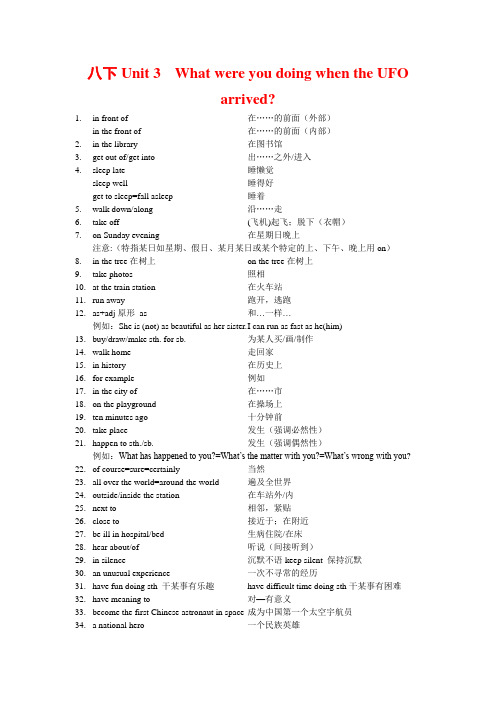
八下Unit 3 What were you doing when the UFOarrived?1.in front of 在……的前面(外部)in the front of 在……的前面(内部)2.in the library 在图书馆3.get out of/get into 出……之外/进入4.sleep late 睡懒觉sleep well 睡得好get to sleep=fall asleep 睡着5.walk down/along 沿……走6.take off (飞机)起飞;脱下(衣帽)7.on Sunday evening 在星期日晚上注意:(特指某日如星期、假日、某月某日或某个特定的上、下午、晚上用on)8.in the tree在树上on the tree在树上9.take photos 照相10.at the train station 在火车站11.run away 跑开,逃跑12.as+adj原形as 和…一样…例如:She is (not) as beautiful as her sister. I can run as fast as he(him)13.buy/draw/make sth. for sb. 为某人买/画/制作14.walk home 走回家15.in history 在历史上16.for example 例如17.in the city of 在……市18.on the playground 在操场上19.ten minutes ago 十分钟前20.take place 发生(强调必然性)21.happen to sth./sb. 发生(强调偶然性)例如:What has happened to you?=What’s the matter with you?=What’s wrong with you?22.of course=sure=certainly 当然23.all over the world=around the world 遍及全世界24.outside/inside the station 在车站外/内25.next to 相邻,紧贴26.close to 接近于;在附近27.be ill in hospital/bed 生病住院/在床28.hear about/of 听说(间接听到)29.in silence 沉默不语 keep silent 保持沉默30.an unusual experience 一次不寻常的经历31.have fun doing sth 干某事有乐趣have difficult time doing sth干某事有困难32.have meaning to 对—有意义33.become the first Chinese astronaut in space 成为中国第一个太空宇航员34. a national hero 一个民族英雄35.35. be famous all over the world 全世界出名36. for the first time 第一次本单元目标句型:What were you doing when I arrived/at that time/at 8:00 last night/from 9:00 to 10:00 yesterday?1.I was doing sth. When+一般过去时的时间状语从句...2.How about... / What about...?3.While sth./sb. was doing sth., I was doing sth....4.当不明飞行物着陆时,你正在干啥?What were you doing when the UFOlanded?5.当妈妈正在做饭时,我在看电视。
Unit3 复习课件人教版八年级英语下册

22.依赖
depend on
23.做家务
do chores
24.把某物借给某人 lend sb. sth.= lend sth. to sb.
25.讨厌做某事
hate to do/ doing sth
26.散步 27.照顾
take a walk care for=look after=take care of
8.在外面待到很晚 stay out late
9.搭车 10.从事
get a ride work on
11.帮助解决
help out with sth.
12.闲逛
hang out
13.至少
at least
14.扔下
throw down
15.过来
come over
16.频繁,反复 all the time
拓展:其他表示委婉请求的常用句型
Would you like (to do) sth.? May I do sth.?/ Shall we do sth.? Would you mind (doing) sth.? What/ How about (doing) sth.?
1. -__C_____ you please help me find my key? -No problem.
C.It's a shame
D.I&hink two hours of TV is enough for you! *two hours of: 在从句中做主语,谓语动词用单数形式。
*当时间、长度、距离或其他可数名词表示 一个完整概念做主语,谓语动词用单数
委婉地请求别人许可: Could I do sth.? 肯定答语:Yes, you can./Sure./I guess so./Certainly / Sure, that should be OK. /Of course. 否定答语: Sorry, you can’t./ I’m afraid you can’t. (并说明理由)
人教版英语八年级下册 Unit3 Could you please clean your room教
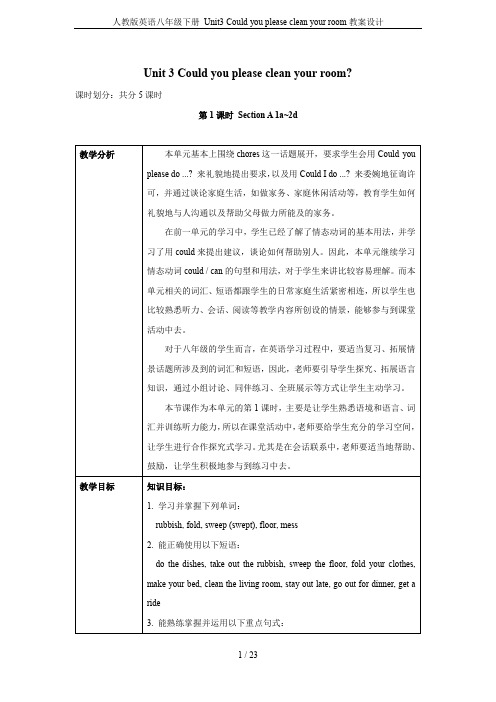
A: Could you please sweep the floor?
B: Yes, sure. Can you do the dishes?
A: Well, could you please do them? I’m going to clean the living room.
Peter
do the dishes
M
sweep the floor
M
take out the trash
P
make the bed
P
fold the clothes
P
clean the
living room
M
2. Make conversations about the chores in 1a.
7) Could you take out the rubbish, fold the clothes and do the dishes?
8) Could I at least finish watching this show?
能力目标:
通过听说训练,学会能够礼貌地提出要求或征询许可,并礼貌地回复别人的请求与征求。
Peter wantsto...
Peter’s fathersays
go out fordinner
√yes _____no
go to themovies
√yes _____no
stay outlate
_____ yes√no
get aride
_____ yes√no
Check answers.
人教版英语八年级下册Unit3语法透视:情态动词could的用法
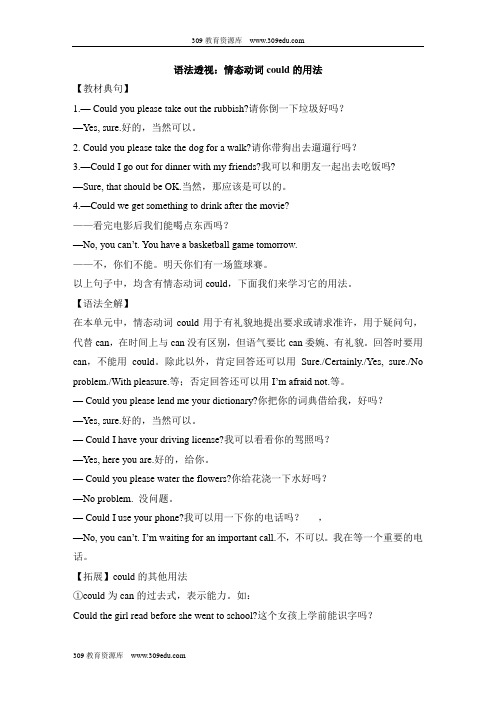
语法透视:情态动词could的用法【教材典句】1.— Could you please take out the rubbish?请你倒一下垃圾好吗?—Yes, sure.好的,当然可以。
2. Could you please take the dog for a walk?请你带狗出去遛遛行吗?3.—Could I go out for dinner with my friends?我可以和朋友一起出去吃饭吗? —Sure, that should be OK.当然,那应该是可以的。
4.—Could we get something to drink after the movie?——看完电影后我们能喝点东西吗?—No, you can’t. You have a basketball game tomorrow.——不,你们不能。
明天你们有一场篮球赛。
以上句子中,均含有情态动词could,下面我们来学习它的用法。
【语法全解】在本单元中,情态动词could用于有礼貌地提出要求或请求准许,用于疑问句,代替can,在时间上与can没有区别,但语气要比can委婉、有礼貌。
回答时要用can,不能用could。
除此以外,肯定回答还可以用Sure./Certainly./Yes, sure./No problem./With pleasure.等;否定回答还可以用I’m afraid not.等。
— Could you please lend me your dictionary?你把你的词典借给我,好吗?—Yes, sure.好的,当然可以。
— Could I have your driving license?我可以看看你的驾照吗?—Yes, here you are.好的,给你。
— Could you please water the flowers?你给花浇一下水好吗?—No problem. 没问题。
Unit-3-单元模块复习课件(含重点单词短语句型-语法-高频考点-对接中考)人教版英语八年级下册

15
3高频考点串联
一、词汇运用
6.— I didn't go to the park yesterday.
—________ did I. I went to the movies with my cousin.
二核心短语与句型55单元主题作文单元主题作文26cleanroomdodishescookingtakeoutrubbishsweepfloorfoldyourclothesmakeyourbeddoshoppingfixmachines打扫房间洗餐具做饭倒垃圾拖地板叠衣服整理床铺购物修理机器二核心短语与句型55单元主题作文单元主题作文27cleanroomdodishescookingtakeoutrubbishsweepfloorfoldyourclothesmakeyourbeddoshoppingfixmachines打扫房间洗餐具做饭倒垃圾拖地板叠衣服整理床铺购物修理机器二核心短语与句型55单元主题作文单元主题作文28couldyoupleasesweepfloor
Review
单元学习目标
4.能根据本单元
2.学会用could提 出要求或征求别 人的许可,并作
3. 能 用 英 语 表达 一些日常家务活。
的所学知识和本 单元的话题,写 出一篇短文表述 自己对于做家务 的观点。
1.会读写并运用 出应答。
本单元重点词汇
和句型。
课件功能说明:
1.课时不够的情况下,课本听力+该课件,助力自由完成单元教学目
4
1单元基础读背
人教版英语八年级下册Unit3《Couldyoupleasecleanyourroom》说课稿
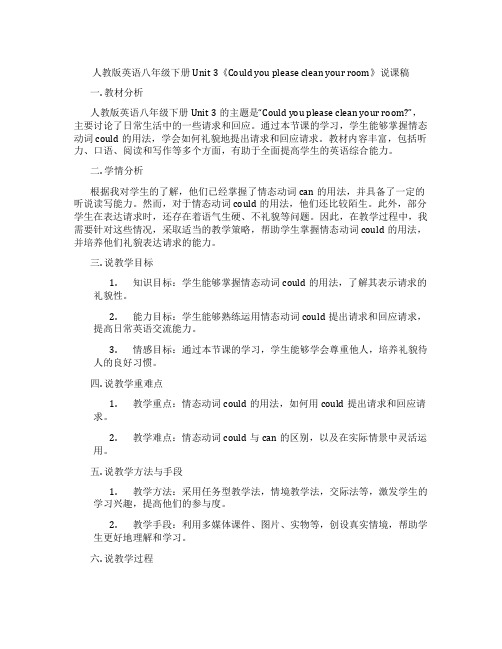
人教版英语八年级下册Unit 3《Could you please clean your room》说课稿一. 教材分析人教版英语八年级下册Unit 3的主题是“Could you please clean your room?”,主要讨论了日常生活中的一些请求和回应。
通过本节课的学习,学生能够掌握情态动词could的用法,学会如何礼貌地提出请求和回应请求。
教材内容丰富,包括听力、口语、阅读和写作等多个方面,有助于全面提高学生的英语综合能力。
二. 学情分析根据我对学生的了解,他们已经掌握了情态动词can的用法,并具备了一定的听说读写能力。
然而,对于情态动词could的用法,他们还比较陌生。
此外,部分学生在表达请求时,还存在着语气生硬、不礼貌等问题。
因此,在教学过程中,我需要针对这些情况,采取适当的教学策略,帮助学生掌握情态动词could的用法,并培养他们礼貌表达请求的能力。
三. 说教学目标1.知识目标:学生能够掌握情态动词could的用法,了解其表示请求的礼貌性。
2.能力目标:学生能够熟练运用情态动词could提出请求和回应请求,提高日常英语交流能力。
3.情感目标:通过本节课的学习,学生能够学会尊重他人,培养礼貌待人的良好习惯。
四. 说教学重难点1.教学重点:情态动词could的用法,如何用could提出请求和回应请求。
2.教学难点:情态动词could与can的区别,以及在实际情景中灵活运用。
五. 说教学方法与手段1.教学方法:采用任务型教学法,情境教学法,交际法等,激发学生的学习兴趣,提高他们的参与度。
2.教学手段:利用多媒体课件、图片、实物等,创设真实情境,帮助学生更好地理解和学习。
六. 说教学过程1.导入:通过播放一段关于孩子们日常生活的视频,引出本节课的主题“Could you please clean your room?”。
2.新课呈现:介绍情态动词could的用法,并通过例句展示如何用could提出请求和回应请求。
八下unit3 SectionA 2a-2d -八年级下册英语同步精美课件(人教版)

3. I tried to
the driving test, but I failed.
— That’s a pity. Good luck to you.
A. past
B. passed C. pass
Homework
1. List all the phrases of doing chores that you know. 2. Make a conversation between you and your mother, using the sentence pattern “Could you please …?”.
Peter wants to… go out for dinner. go to the movies. stay out late. get a ride.
Peter’s father says…
√ Yes
No
√ Yes
No
Yes
√ No
Yes
√ No
2b Listen again. Why does Peter’s father say “no”? Draw lines to the reasons.
单项选择。
1. —Jeff, could you tell me how to order a taxi
online?
—
.
A. You’re welcome B. Sure C. Take it easy
2. Please
the rubbish.
A. take out B. take it out C. takes out
Dad: No, you can’t. You have a basketball game tomorrow, remember? You need to have a good rest . Peter: Oh, yeah. Well, could you give me a ride to town now? If I take the bus, I’ll be late . Dad: I can’t, Peter. I have to do some work now. Peter: Oh, OK. No problem. I’ll call Alan.
(完整版)人教版八年级英语下册Unit3Couldyoupleasecleanyourroom重点词
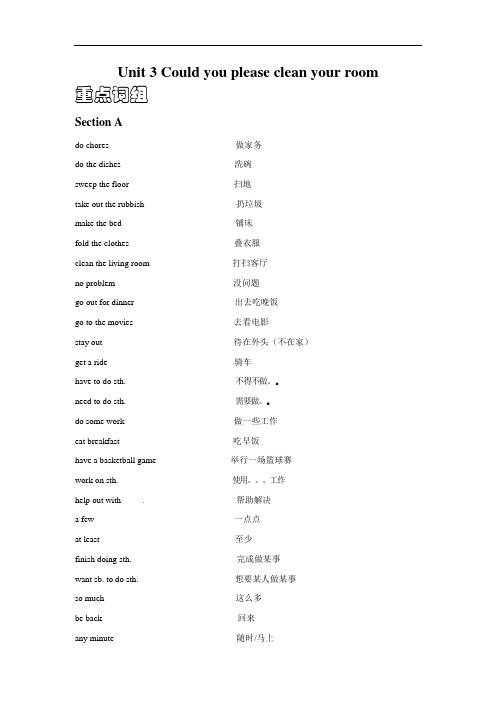
Unit 3 Could you please clean your room 重点词组Section Ado chores 做家务do the dishes 洗碗sweep the floor 扫地take out the rubbish 扔垃圾make the bed 铺床fold the clothes 叠衣服clean the living room 打扫客厅no problem 没问题go out for dinner 出去吃晚饭go to the movies 去看电影stay out 待在外头(不在家)get a ride 骑车have to do sth. 不得不做。
need to do sth. 需要做。
do some work 做一些工作eat breakfast 吃早饭have a basketball game 举行一场篮球赛work on sth. 使用。
工作help out with 帮助解决a few 一点点at least 至少finish doing sth. 完成做某事want sb. to do sth. 想要某人做某事so much 这么多be back 回来any minute 随时/马上clean and tidy 干净整洁be angry with 对某人生气solve the problem 解决问题throw down 扔下in front of 在。
前面come over 过来take...for a walk 带。
去散步all the time 一直all day 整个白天do housework 做家务all evening 整个夜晚shout back 吼叫还击walk away 走开come home from work 下班回家in surprise 惊讶地share the housework 分担家务sit down 坐下hang out 出去玩help sb. (to) do sth. 帮助某人做某事how much 多少come back 回来try (not) to do sth. 努力(不)做某事hate to do sth. 讨厌做某事Section Bask sb. to do sth. 让某人做某事next to 靠近have a party 参加派对have a test 参加考试mean doing sth. 意味着。
人教版英语八年级下册Unit3知识点总结
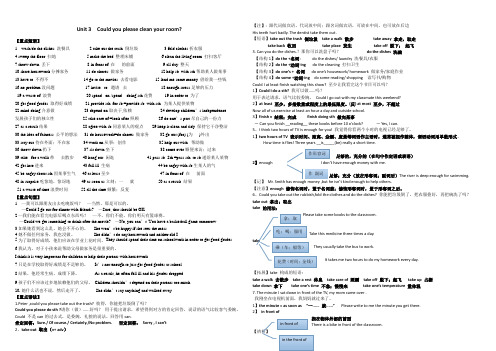
Unit 3 Could you please clean your room?【重点短语】1.wash/do the dishes 洗餐具2.take out the trash 倒垃圾3.fold clothes折衣服4.sweep the floor 扫地5.make the bed 整理床铺6.clean the living room 打扫客厅7.throw down 丢下8.in front of 在......的前面9.all day 整天10.share housework分摊家务11.do chores 做家务12.help sb. with sth.帮助某人做某事13.have to 不得不14.go to the movies 去看电影15.lend me some money 借给我一些钱16.no problem没问题17.invite...to...邀请...去... 18.enough stress足够的压力19.a waste of 浪费...... 20.spend...on /spend ...doing sth.花费....... 19.in order to 为了20.get good grades 取得好成绩21.provide sth. for sb.=provide sb. with sth. 为某人提供某物22.mind doing介意做....... 23.depend on取决于,依赖24.develop children’s independence发展孩子们的独立性25.take care of =look after照顾26.do one’s part尽自己的一份力27.as a result结果28.agree with sb.同意某人的观点29.keep it clean and tidy 保持它干净整洁30.the idea of fairness 公平的想法31.do housework=do chores 做家务32.go out (for) (为......)外出33.stay out待在外面;不在家34.work on从事;创作35.help out with...帮助做......36.throw down扔下37.sit down坐下e over顺便来访;过来39.take...for a walk带......去散步40.hang out 闲逛41.pass sb. Sth.=pass sth. to sb.递给某人某物42.get into进来43.fall ill 生病44.be angry with sb.生某人的气45.be angry about sth.因某事生气46.at least至少47.in front of 在......前面48.in surprise吃惊地,惊讶地49.as soon as立刻;一......就...... 50.as a result 结果51.a waste of time浪费时间52.all the time频繁;反复【重点句型】1.—我可以跟朋友出去吃晚饭吗?—当然,那是可以的。
Unit3 Section A 3a-3c 课件 人教版八年级下册英语

Could you please clean your room?
Section A Period Two
(3a-3c)
Could you please _______?
do the dishes make the bed take out the rubbish
clean the fold the clothes sweep the floor living room
1.Work in groups. Role-play the conversation. Then present in the class.
●Student A read the text.
●Student B plays the role of “mom”. Student C plays the role of “Nancy”. 2.Retell the story ( 5 wh- Qs )
Write more sentences that have the same meanings as the three given sentences.
1. Both of us did not do any housework for a week.
For a week, we both did no housework.
NOUN
a word that describes an action or a state
a word that names a person, a place, a thing, an activity or a quality
Give as many verbs and nouns as you can.
2. My mom came over as soon as I sat down in front of the TV.
Unit3 单元知识点总结课件--八年级英语下册(人教版)

A.return back
B.return
C.give
4. —— Last week I ____________ a CD ____________ my neighbor.
—— You shouldn’t ____________ it ____________ Xiao Wang.
A. borrowed; from; lend; to B. lent; from; borrow; to
2.5 drop
v. 落下;掉下;降低 (drop- dropped-dropped- dropping)
The glass dropped and broken. Be careful not to drop the glass. drop by 顺便拜访
n. drop 滴,水珠 A drop of water 一滴水
—— ________. I’m going to do my homework.
A. Sorry, I can’t
B. No, I couldn’t
C. Yes, you can
D. Never
3. Would you please _______ the children ______ on the street?
(in)dependent adj. (不)独立的
China is a dependent country.
2.2 provide
provide
✓ provide sb. with sth. ✓ provide sth. for sb.
提供某人某物
I provided some food for him. I provided him with some food.
人教版英语八年级下册Unit3教材解读

Unit3 名师教材解读1. Textbook Analysis教材解读本单元以“家务琐事与许可(Chores and permission)”为话题,围绕做家务,让学生学会如何礼貌地提出请求和征求许可。
Section A在内容上侧重谈论家务琐事及家庭互助,对学生家庭责任感的建立、良好生活习惯养成以及良好社会行为习惯的培养起着重要作用,需要学生学习、操练有关语言内容和技能。
在语法方面,要求学生掌握“could”句型不同功能的分辨及应答,培养学生的实际运用能力。
在情感态度方面,教师借助本部分内容的学习,帮助学生养成文明礼貌、体谅家人、勤动手的好习惯,让学生意识到自己有必要帮助父母亲做一些力所能及的事情减轻父母的负担,养成良好的生活习惯和劳动习惯,学会照顾自己,培养学生的独立意识。
Section B在话题上,侧重孩子和家长在家庭事务方面的不同分工及关系,是知识的扩展和综合的语言运用.本部分注重学生的个人表达能力训练,重点练习动词短语的用法。
从谈论家务---对家务的看法.父母和孩子之间承担的家务延展到社交、休闲等等。
在语言上,进一步丰富与家务相关的话题词汇及短语并鼓励学生的创造性发挥。
在技能上,将听说能力综合,让学生学会通过扩大阅读量,用略读快速把握文章大意,提高阅读技巧培养语感。
突出阅读训练,由读促写。
在教学策略上,教师主导,学生主体师生双边活动。
在情感上,让学生学会有礼貌地与人沟通交流,帮助父母做力所能及的家务,增强孩子的责任感、动手能力和观察能力,促使孩子思考解决问题的办法,培养孩子的耐心、坚持不懈及积极上进的生活态度。
1.1 Section A 1a 活动1a是Lead-in部分。
旨在通过Free talk导入新的语言现象,谈论家务琐事及家务互助。
通过结对活动,讨论做哪些家务活来引入本单元的重点词汇。
教师可以鼓励学生了解他人和反思自己的生活习惯,提出不同琐事表达法以及礼貌委婉地提出要求的句型表达,是词汇及句型的输入阶段。
人教版八年级下册英语第3单元Unit 3 语法知识点提纲

人教版八年级下册英语第3单元Unit 3 语法知识点提纲Unit 3 Could you please clean your room?一.重点词汇1.Rubbish n. 垃圾;废弃物该词为不可数名词。
同义词有:waste, trash, garbage,litter 2.Take ou the rubbishTake out v. 带出去,取出;除掉,拔出该词组的宾语如果是代词(it/them)时,代词要放在take和out 之间。
3.Fold v. 折叠;对折unfold v. 展开;呈现4.Mess n. 杂乱;不整洁[常见搭配] be in a mess 乱七八糟,处境困难;凌乱Messy adj. 凌乱的;使不整洁的5.Throw v. 扔;掷threw (过去式)[常见搭配] throw away 扔掉,丢弃throw out 扔掉;伸出;说出throw into 扔进;使...(突然)陷入6.Neither adv. 也不;pron. 两者都不[用法](1)”neither/nor + 情态动词/助动词/be动词+ 主语”是一个倒装结构,表示前句的否定情况也适应于后面的人或物。
该结构中的助动词,情态动词,be动词形式必须与前面句子的谓语动词时态,以及后面句子的主语的人称和数保持一致。
例如:Mary can’t play the guitar, neither can her sister.I don’t like this book, neither does Tom.(2)Neither (of) + n. 作主语时,谓语动词用单数。
例如:Neither of the two boys likes playing football.Neither answer is right.(3)Neither...nor... 既不...也不...当链接两个并列主语时,谓语动词通常要与nor后面的名词或代词在人称和数上保持一致,即该结构要用就近原则。
人教版八年级英语下册-Unit-3-Could-you-please-clean-your-room-重点词组+重点句型+重点语法+综合练习题
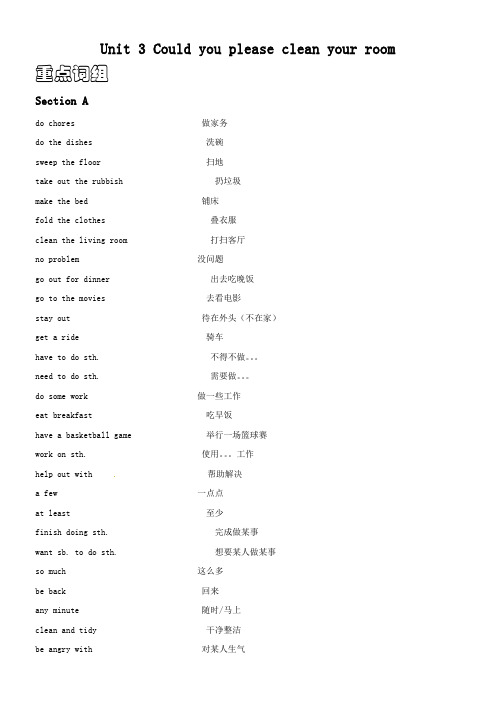
Unit 3 Could you please clean your room 重点词组Section Ado chores 做家务do the dishes 洗碗sweep the floor 扫地take out the rubbish 扔垃圾make the bed 铺床fold the clothes 叠衣服clean the living room 打扫客厅no problem 没问题go out for dinner 出去吃晚饭go to the movies 去看电影stay out 待在外头(不在家)get a ride 骑车have to do sth. 不得不做。
need to do sth. 需要做。
do some work 做一些工作eat breakfast 吃早饭have a basketball game 举行一场篮球赛work on sth. 使用。
工作help out with 帮助解决a few 一点点at least 至少finish doing sth. 完成做某事want sb. to do sth. 想要某人做某事so much 这么多be back 回来any minute 随时/马上clean and tidy 干净整洁be angry with 对某人生气solve the problem 解决问题throw down 扔下in front of 在。
前面come over 过来take...for a walk 带。
去散步all the time 一直all day 整个白天do housework 做家务all evening 整个夜晚shout back 吼叫还击walk away 走开come home from work 下班回家in surprise 惊讶地share the housework 分担家务sit down 坐下hang out 出去玩help sb. (to) do sth. 帮助某人做某事how much 多少come back 回来try (not) to do sth. 努力(不)做某事hate to do sth. 讨厌做某事Section Bask sb. to do sth. 让某人做某事next to 靠近have a party 参加派对have a test 参加考试mean doing sth. 意味着。
人教版英语八年级下册 单词 短语 语法
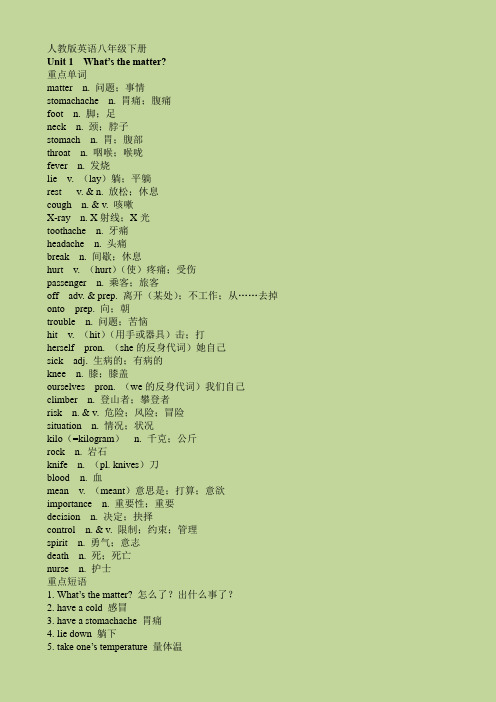
人教版英语八年级下册Unit 1What’s the matter?重点单词matter n. 问题;事情stomachache n. 胃痛;腹痛foot n. 脚;足neck n. 颈;脖子stomach n. 胃;腹部throat n. 咽喉;喉咙fever n. 发烧lie v. (lay)躺;平躺rest v. & n. 放松;休息cough n. & v. 咳嗽X-ray n. X射线;X光toothache n. 牙痛headache n. 头痛break n. 间歇;休息hurt v. (hurt)(使)疼痛;受伤passenger n. 乘客;旅客off adv. & prep. 离开(某处);不工作;从……去掉onto prep. 向;朝trouble n. 问题;苦恼hit v. (hit)(用手或器具)击;打herself pron. (she的反身代词)她自己sick adj. 生病的;有病的knee n. 膝;膝盖ourselves pron. (we的反身代词)我们自己climber n. 登山者;攀登者risk n. & v. 危险;风险;冒险situation n. 情况;状况kilo(=kilogram)n. 千克;公斤rock n. 岩石knife n. (pl. knives)刀blood n. 血mean v. (meant)意思是;打算;意欲importance n. 重要性;重要decision n. 决定;抉择control n. & v. 限制;约束;管理spirit n. 勇气;意志death n. 死;死亡nurse n. 护士重点短语1. What’s the matt er? 怎么了?出什么事了?2. have a cold 感冒3. have a stomachache 胃痛4. lie down 躺下5. take one’s temperature 量体温6. have a fever 发烧7. take breaks(take a break)休息8. get off 下车9. to one’s surprise 使……惊讶的;出乎……意料10. right away 立即;马上11. get into 陷入;参与12. be used to 习惯于……;适应于……13. take risks(take a risk) 冒险14. run out (of) 用尽;耗尽15. cut off 切除16. get out of 离开;从……出来17. be in control of 掌管;管理18. give up 放弃重点句型1. —What’s the matter?—I have a stomachache.2. —W hat’s the matter with Ben?—He hurt himself. He has a sore back.3. —Do you have a fever?—Yes, I do. / No, I don’t./I don’t know.4. —Does he have a toothache?—Yes, he does.5. —What should she do?—She should take her temperature.6. —Should I put some medicine on it?—Yes, you should. / No, you shouldn’t.7. You shouldn’t eat so much next time.He should lie down and rest.He should see a dentist and get X-ray.重点语法1. have在涉及健康问题的句子中的应用。
人教版初中英语八年级下册语法知识点
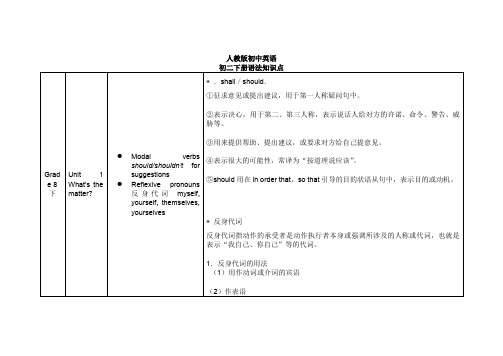
4.动词+副词+介词(其后需加宾语)
5.动词+名词(其后不加宾语)
make a bed整理床铺take place发生make faces做鬼脸
6.动词+名词+介词(其后需加宾语)
It is very kind of you to help me.=You are very kind to help me.你帮我的忙,太谢谢你了。
5.疑问词和不定式连用和疑问词连用的不定式在句中相当于名词,常作主语、宾语、表语、同位语等。
6.省略to的不定式
(1)当两个(或两个以上的)不定式由and,or,than等连接时,通常只需在第一个不定式前用to,其余不定式前的to可省略。
4)当某些结构后的不定式动作与句中某一动作重复时,不定式符号to之后的其他成分可以省略,只保留不定式符号to。常见结构有:be able to,be going to,have to,ought to,used to等。
8.不定式的主动表示被动
①在“be+性质形容词+不定式”结构中。
此类形容词有easy,hard,difficult,interesting,heavy,pleasant,comfortable,safe,dangerous,impossible等。
4.不定式的复合结构不定式用for和of引出逻辑主语,带有逻辑主语的不定式称为不定式的复合结构。不定式的复合结构在句中可作主语、宾语、定语等。
当作表语的形容词表示人的性格、品质时,常用of引出不定式的逻辑主语,否则用for引出。常见的表示性格、品质的形容词有:
good好的kind和蔼的brave勇敢的honest诚实的lazy懒惰的nice好的wise明智的clever聪明的silly傻的stupid笨的foolish愚蠢的right正确的wrong错的rude粗鲁的polite礼貌的fair公正的unfair不公正的careless粗心的careful细心的patient耐心的
人教八年级英语下册Unit3语法(共计16张PPT)

A. mustn't B. can't C. needn't
D. may not
( )4. —Must I do my homework at once? —No, you___.
A. needn't B. mustn't C. can't
D. may not
( )5. May I go swimming now? -- No, you ____. You should finish your homework first. A. mustn’t B. may not C. couldn’t D. needn’t
Homework 1.自学SectionB1a-1c勾画疑点,并完成导学预习 2.背单词U3SectionB前10个 3.笔记整理 :could 用法及相关知识联系和拓展
小结could的用法
1. 表示委婉请求,意为“可以…吗”。 Could I use your pen?
2.表示过去一般的能力,意为“能、会”。 Could you speak English then? 3. 表示猜测时,意为“可能”。
You could be right, but I don’t think you are.
知识延伸: could及相关情态动词 表猜测:
must
“一定”
பைடு நூலகம்
把握大的肯定猜测。
may / might /could “ 可能/ 或许 ”把握不大的猜测(肯否均可)。
can’t
“不可能” 把握大的否定猜测。
1. After a long walk, you ___m__u_s_t ___ feel tired. 2. The man ___ca_n__`t___ be Tom. He left here yesterday. 3. My mom m__a_y__/m__ig_h__t/_c_o_u_l_d_ go the visit grandpa but I
- 1、下载文档前请自行甄别文档内容的完整性,平台不提供额外的编辑、内容补充、找答案等附加服务。
- 2、"仅部分预览"的文档,不可在线预览部分如存在完整性等问题,可反馈申请退款(可完整预览的文档不适用该条件!)。
- 3、如文档侵犯您的权益,请联系客服反馈,我们会尽快为您处理(人工客服工作时间:9:00-18:30)。
1、过去进行时表示过去某一段时间或某一时刻正 在 进行的动作。
What were you doing at 7p.m. yesterday? 昨天晚上七点你在干什么?
I first met Mary three years ago. She was working at a radio shop at the time. 我第一 次遇到玛丽是在三年前,当时她在一家无线电商店 工作。
I was doing my homework at this time yesterday. 昨天的这个时候我正在做作业。
They were waiting for you yesterday. 他们昨天一直在等你。
.
过去进行时的构成:
肯定形式:主语+was/were+V-ing 否定形式:主语+was not (wasn‘t)/were
I was cooking when she knocked at the door. 她敲门时我正在做饭。
.
2. when后通常用表示短暂性动词,while后通常用表示持 续性动词,因此它所引导的状语从句中,谓语动词常用进 行时态,
When the car exploded I was walking past it. = While I was walking past the car it exploded.
not (weren’t)+V-ing 疑问形式:Was/Were+主语+V-ing
.
1、过去进行时表示过去某一段时间或某一时刻正 在进行的动作。
常与之连用的时间状语有,at that time/moment, (at) this time yesterday (last night/Sunday/week…), at+点钟 +yesterday (last night / Sunday…), when sb. did sth等时间状语从句,
.
be amazing与be amazed
be amazing 令人惊奇的(修饰事物的,指某事令人 惊奇,比surprising更具意外性
eg. She has an amazing talent for music.她 在音乐方面有惊人的才华。 Isn’t that amazing .那不很令人意外吗?
be amazed (at sth./to do …/that 从句)(某人) 对…(因…而)大感惊讶(指人作主语)
eg. We were amazed at the news.
=We were amazed to hear the news. 我们对这个消息感到非常惊讶.
.
in a tree与 on a tree
in(at) the front of 在……的前头,前排(列) (在一个范围内的前面部位) eg. She sat in the front of the bus. 她坐 在公交车的前排
.
get out of 与get into 是反义词
get into走进,进入 eg. He get out of the car and gБайду номын сангаасt into the building
Unit 3
What were you doing when the UFO arrived?
.
in front of 与in (at) the front of
in front of 在……的前面 (表示“有距离的前 面”,在一个参照物的前面) eg. There is a car in front of the house. 房子前面有一辆车
in a tree eg. Are there any birds in the tree? 树上有些鸟吗?
on a tree 在树上(指长在树上的东西) eg. Look! There are many apples on the tree.
.
Grammar
—————过去进行时
.
过去进行时表示过去某一时刻或者某段时间正在进行或发 生的动作,常和表过去的时间状语连用,如:
I was taking a walk when I met him. 我正在散步,突然遇见了他。
We were playing outside when it began to rain. 我们正在外边玩,这时下 起雨来了。
.
感谢亲观看此幻灯片,此课件部分内容来源于网络, 如有侵权请及时联系我们删除,谢谢配合!
.
3.when用作并列连词时,主句常用进行时态,从句则用一 般过去时,表示主句动作发生的过程中,另一个意想不到 的动作发生了。
I was walking in the street when someone called me. 我正在街上走时突然有人喊我。
.
4. when作并列连词,表示“(这时)突然”之意时,第一 个并列分句用过去进行时,when引导的并列分句用一般过 去时。
